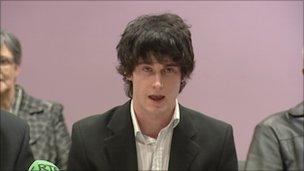McGurk's bar bomb report alleges 'investigative bias'
- Published
Police in NI were so focused on the idea that the IRA was behind a 1971 bar bombing that it was not properly investigated, a report has said.
Fifteen people died in the McGurk's bar attack in Belfast, the worst Troubles atrocity prior to the Omagh bomb.
The NI Police Ombudsman said there was no collusion between the Royal Ulster Constabulary and the loyalist paramilitaries responsible.
However, he said there was an "investigative bias".
Ombudsman Al Hutchinson originally intended to publish his report last summer but withdrew it after it was criticised by survivors and the families of those who died.
Its original conclusion that, on the balance of probabilities, the police conducted a "reasonably thorough investigation" was criticised by some people who called it "patently ridiculous".
In a new report published on Monday, Mr Hutchinson said the RUC's "investigative bias" undermined "both the investigation and any confidence the bereaved families had in obtaining justice".
He found that police gave selective briefings to the government and to the media that republican paramilitaries were behind the attack.
Shortly after the bombing, then Stormont home affairs minister John Taylor said he believed the IRA was responsible.
This had caused the bereaved families great distress which has continued for many years, Mr Hutchinson said.
"The police investigation had a clear predisposition to the erroneous 'own goal' theory," Mr Hutchinson said.
"This was perhaps in some way understandable given the extent of IRA bombings and attacks at the time.
"However, the investigative bias leading to a failure to examine properly evidence and intelligence attributing the bombing to loyalist paramilitaries undermined both the investigation and any confidence the bereaved families had in obtaining justice."
He added that he had not found an explanation as to why successive chief constables had not addressed "this erroneous perception" and that it would be a "significant step" for the current PSNI chief to do so.
The ombudsman's investigation found no evidence that members of the RUC assisted the passage of Ulster Volunteer Force paramilitaries in getting to or away from the bar.
He also acknowledged that police and other emergency services had come under sustained gun attack in the vicinity leaving one man dead and others injured and frustrating the initial investigation. But he stressed that the investigation was "not proportionate" to the magnitude of the attack and police failed to give "adequate consideration" to the possible involvement of loyalists.
Christopher McGurk, who lost his mother and sister in the bombing, said he was pleased with the report's findings.
"What my family has known all along, and what my dad had always told me is that the investigation was indeed guilty of bias, and that has been officially acknowledged for the first time.
"If you look at the report, time and time again there are examples of police bias and Mr Hutchinson concludes that the investigation was selective and consequently misleading.
"He brands this a 'serious failure' and I am very happy with this."

Christopher McGurk lost his grandmother, great uncle and aunt in the blast
Chief Constable Matt Baggott said on Monday that he "acknowledged the hurt" caused by the allegations.
"Let me state immediately, it is the unequivocal belief of the Police Service of Northern Ireland, that none of the victims were in any way involved in causing this atrocity.
"I regret if there has been any continued confusion around this and it is right that the record be put straight once and for all," he added.
The bomb exploded at the bar at Great George's Street in north Belfast killing 15, including three women and two children, and injuring more than 16 others.
In 1978, UVF member Robert Campbell was convicted of his part in the attack.
But Mr Baggott said any further prosecutions were unlikely.
"It is my view that there appear to be no further investigative opportunities available.
"At present all lines of inquiry have been exhausted but we will discuss any future opportunities with the Ombudsman," he added.
Anger
However, the Pat Finucane Centre and British Irish Watch have said they were "deeply disappointed and angered" at the statement issued by the Chief Constable.
"Mr Baggott's statement falls very far short of the apology which the families deserve and which the circumstances demand," they said in a statement.
"It also fails to fulfill the Ombudsman's recommendation that he make a statement "to acknowledge the enduring pain caused to the families by the actions of police following the atrocity".
They said there had been no investigations that cleared the police of investigatory bias.
"The families will be hurt and re-traumatised by the chief constable's statement," they said.
"He has missed an opportunity to lift a shadow from their lives and set the record straight."
Chairman of the Northern Ireland Policing Board Brian Rea said: "First and foremost our thoughts are with the families of those who lost loved ones in the McGurk's bar bombing, those who were injured and those who survived this terrible attack.
"The Chief Constable has made a statement on the Police Ombudsman's Report and the Board will wish to discuss this with him at its next meeting."
SDLP North Belfast MLA, Alban Maginness, called on the chief constable to make a full apology to the families of the McGurk's bar bomb.
"The report from the police ombudsman into the terrible atrocity confirms what many knew already - that there was major failure in the police investigation into the murders," he said.
"The police ombudsman has drawn a distinction between 'investigative bias' and collusion. Many may find this distinction dubious but it is clear the end result was the same."
- Published21 February 2011
- Published9 July 2010
- Published8 July 2010
- Published9 July 2010